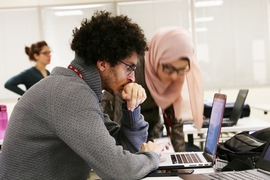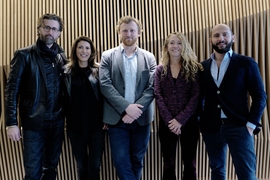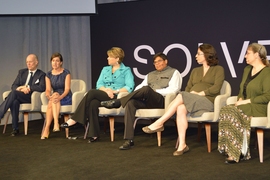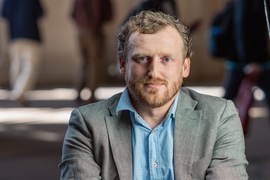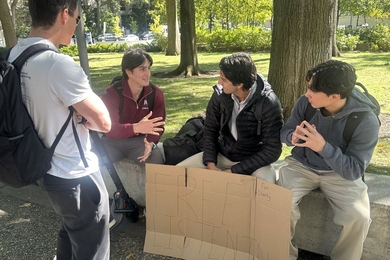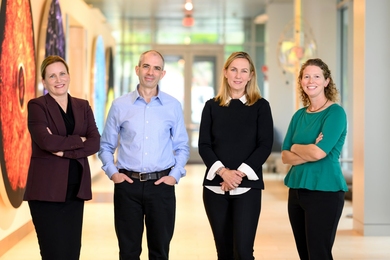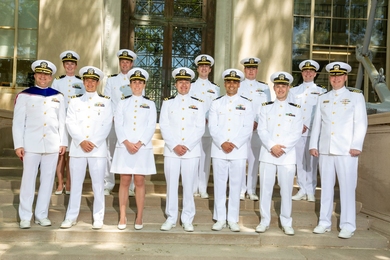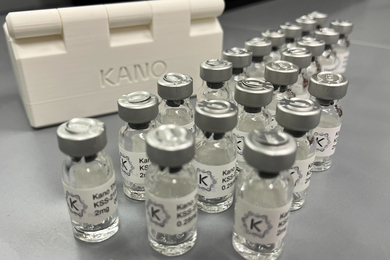This week, the MIT Refugee Action Hub (ReACT) announced that it is now accepting applications for the second offering of the Certificate Program in Computer and Data Science. The one-year course of study is designed for refugees and other displaced people around the world, and offers them the opportunity to earn a certificate in a rigorous, yet accessible program that allows young adults to reactivate their potential and restart careers.
The inaugural group of students will be completing their studies in January 2019. The blended program will continue to offer a core online curriculum of the edX catalogue along with an immersive set of in-person workshops and classes offered by MIT faculty and staff. These offerings include an entrepreneurship program, led by the MIT Bootcamps and a MakerLab run by the Little Devices Lab.
Admir Masic, faculty lead and the Esther and Harold E. Edgerton Career Development Professor in the Department of Civil and Environmental Engineering, founded ReACT in 2017 with a mission to provide blended learning opportunities to refugees around the world.
“I’m very excited that ReACT and the MIT community are able to offer this program again. In the past year, we have been learning along with our students, and tuned and tweaked the program to make it better and more impactful,” Masic says. “This year we look forward to accepting more refugees from around the world and activating their talents and potential, so they can learn more, do more on the global stage, and inspire their communities as well.”
In June 2018, ReACT partnered with the MITx MicroMasters program in data, economics, and development policy (DEDP) and the Abdul Latif Jameel Poverty Action Lab (J-PAL) to offer refugee learners the opportunity to receive scholarships for DEDP courses, participate in skills-building workshops, and connect with top organizations and companies in the competitive field of development economics and data analysis. ReACT is now sponsoring eight students from three different continents currently enrolled in its pilot cohort.
ReACT Executive Director Robert Fadel says ReACT, MITx, and MIT Open Learning are “actively extending the range of learning engagements available for displaced people.”
“Together with our partners we can begin to construct a narrative of opportunities that includes bridging programs, higher education, and graduate education,” he says. “Building stable pathways for careers and prosperity is our goal.”
Such stability was important for Muhammad Enjari, a 39-year-old petroleum engineer from Homs, Syria. He fled Homs with his wife and three children at the beginning of the Syrian revolution before settling in Jordan. “I have a degree in petroleum engineering but in Jordan I could not find a job,” he says.
Enjari enrolled in the 6.00.1x MOOC (Introduction to Computer Science using Python) through ReACT’s year-long Computer and Data Science Program (CDSP) curriculum and received a 100 percent on the final exam and final grade. With the skills he learned through this coursework, Enjari began a new job as a paid intern in computer engineering with Edraak, a MOOC platform similar to edX for Arabic-speaking students.
Another ReACT CDSP student, 23-year-old Manda Awad, enrolled in 6.00.1x while living in Jordan as a refugee from Palestine and learned that some of the online course material was not included in her computer science curriculum at the University of Jordan. This, coupled with a lack of support for women in tech, inspired Awad to propose an update to the University of Jordan engineering department’s computer science curricula by integrating the 6.00 series coursework
“I want to take what I have learned and teach other students, particularly women,” she says. Awad is currently setting up a programming club with a weekly instructional segment and her goal is to launch a “Women who Code” group to the Zaatari refugee camp in Jordan early next year.
ReACT is a part of MIT Open Learning, which looks to extend and expand educational and development opportunities worldwide, with ReACT focusing on adult refugee learners globally. ReACT seeks to design, develop, and deliver new curricula and hybrid learning models to specifically address the needs and expectations of displaced learners and workers, as well as their communities.
“The important work that ReACT is doing to provide training and opportunities for displaced people fits perfectly into the Open Learning mission of making education more accessible to all,” says Sanjay Sarma, Vice President for Open Learning. “We’re proud to welcome ReACT to Open Learning and can’t wait to see how this next cohort of learners grows and thrives.”
Masic encourages organizations that are interested in sponsoring an internship for students in the program to contact ReACT.

